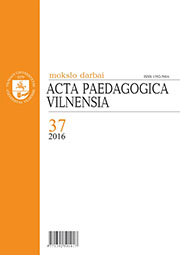Ar Lietuvos mokytojams vis dar reikia tobulinti kvalifikaciją?
Do Lithuanian teachers still need professional development?
Author(s): Albinas KalvaitisSubject(s): School education, Adult Education, Social development, Present Times (2010 - today)
Published by: Vilniaus Universiteto Leidykla
Keywords: general education school; teacher; professional development; quality of education;
Summary/Abstract: The analysis presented within this article is based on results of a study carried out in 2014. A total of 683 teachers from 218 different general education schools were questioned. The respondents were asked about the last professional development event they had attended: its form, duration, location, participation fees funding source, etc. Also, respondents were asked if the event they had mentioned before was useful. That is how it was known that, according to the respondents, the least useful were traditional professional development events (primarily the seminars); also, of minor use were deemed events that were held for 6 academic hours or less. The survey shows that when the same respondents were asked what professional development events would be the most suitable for them, the majority indicated seminars and events with a duration of 6 academic hours or less – the types of events that teachers pointed out to be the least useful professional development events. The same answers were Janssen, S.; Kreijns, K.; Bastiaens, T. J.; Stijnen, S.; Vermeulen M. (2013). Teachers’ beliefs about using a professional development plan. International Journal of Training and Development, Vol. 17 (4), p. 260–278. Kalvaitis, A. (2014). Kvalifikacijos tobulinimo paslaugų įtaka praktinei bendrojo ugdymo mokyklos mokytojo veiklai. Tyrimo ataskaita. Internetinė prieiga: https://sodas.ugdome.lt/metodiniai-dokumentai/ perziura/3835 [Žiūrėta: 2016 09 22]. LaCursia, N. (2011). Perceptions of Professional Development from Northern Illinois Secondary Public School Health Teachers and School Administrators. The Health Educator, Vol. 43(2), p. 27–36. Lietuvos švietimo įstatymas. Internetinė prieiga: http://www3.lrs.lt/pls/inter3/dokpaieska.showdoc_l?p_ id=395105&p_query=&p_tr2= [Žiūrėta: 2016 09 22]. Martišauskienė, E. (2010). Mokytojų požiūris į gebėjimus kaip profesijos kompetencijų dėmenį. Acta Paedagogica Vilnensia, t. 24, p. 101–113. Mokytojo profesijos kompetencijos aprašas. Internetinė prieiga: http://www3.lrs.lt/pls/inter3/ dokpaieska.showdoc_l?p_id=291726&p_query=& p_tr2= [Žiūrėta: 2016 09 22]. Pedagogo profesijos kompetencijų aprašo projektas. Internetinė prieiga: http://www.upc.smm.lt/ projektai/pkt/rezultatai.php [Žiūrėta: 2016 09 22]. Pella, S. (2015). Pedagogical Reasoning and Action: Affordances of Practice-Based Teacher Professional Development. Teacher Education Quarterly, Vol. 42(3), p. 81–101. Reeves, T. D.; Pedulla, J. J. (2013). Bolstering the Impact of Online Professional Development for Teachers. The Journal of Educational Research & Policy Studies, Vol. 1, p. 50–66. Smilgienė, J. (2012). Ikimokyklinių ugdymo įstaigų pedagogų kompetencijų tobulinimo poreikis bei galimybės dalyvaujant profesinėje veikloje. Mokytojų ugdymas, t. 18 (1), p. 12–29. Trakšelys, K.; Martišauskienė, D. (2013). Pedagogo profesionalizacijos aspektai modernioje visuomenėje. Tiltai, t. 2, p. 145–161. Urnėžienė, E.; Budrytė, K. (2014). Specialiojo pedagogo kompetencijos ir jų tobulinimo galimybės, pedagogų požiūriu. Pedagogika, t. 115(3), p. 135–146. DO LITHUANIAN TEACHERS STILL NEED PROFESSIONAL DEVELOPMENT? Albinas Kalvaitis Summary collected from the respondents, who attended more useful professional development events themselves. At the same time, the results demonstrated that school administration delegates and teachers sufficiently enough register professional development facts and gather confirmative documents of the professional development. Confirmative documents of the professional development are necessary, for example, if the teacher wants to get a higher qualification category. It could be said that for the bigger part of Lithuanian teachers, the obligatory professional development according to the Law of Education has become not an opportunity to improve their specific abilities and to educate more qualitatively during the lesson, but, unfortunately, turned into some sort of a ritual, which permits one to acquire the participation certificate of the professional development event faster and using as little expenditure as possible.
Journal: Acta Paedagogica Vilnensia
- Issue Year: 2016
- Issue No: 37
- Page Range: 35-44
- Page Count: 10
- Language: Lithuanian

